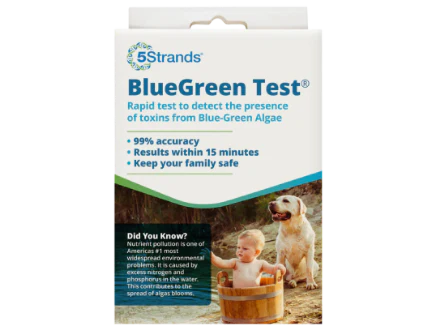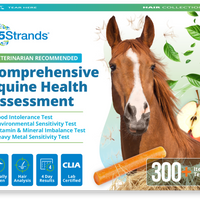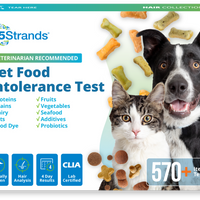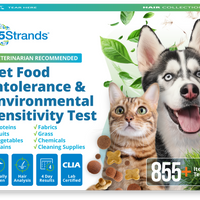We are right in the middle of pollen season right now. Many of our pets are itching and scratching, biting their paws, and licking themselves into having raw spots on their bodies. If this just started in the spring, it could be just environmental allergies/intolerances that are causing them symptoms. If they seem to experience these symptoms year round, then it might be a food allergy/intolerance. Or, it could be both!
We want our furry friends to be healthy and happy, so what can we do when we see these symptoms happening? The following is an article about some home remedies you can try to see if you can help your pet feel better. When all else fails, talk to your vet about testing for allergies and intolerances so you can get to the root cause of what is really causing your pet’s discomforts.
Skin allergies are common in many dog breeds. Learn how you can soothe your dog’s symptoms while treating their allergies at home.
Written by Marissa Taffer — Medically reviewed by Dr. Michelle Diener
Updated January 11, 2022
10 home remedies for dog skin allergies - betterpet

If your pup has skin allergies, they might have dry, itchy skin or other uncomfortable symptoms. So as a pet owner it’s understandable that you want to do everything you can to soothe the discomfort.
That’s why we’ve put together this list of home remedies designed to help your dog’s allergies. Remember, these aren’t replacements for medical treatment provided by your vet. But, you can use this list to talk with your vet about the best ways to soothe the itch and help your dog feel better fast.
👉 Don’t try any of these remedies until your pup has received medical care and the approval of your vet!
10 remedies to help soothe your dog’s skin allergy symptoms
Depending on the nature and severity of your dog’s symptoms we’ve rounded up 10 things you can try. From dry skin to flea bites or intense scratching, there’s a product out there that can help.
1. Add omega-3 fatty acids to your dog’s diet in the form of salmon oil
Salmon oil has many benefits — including keeping your dog’s skin and coat healthy. It’s a great source of omega-3 fatty acids which have anti-inflammatory properties. If your pup has skin allergies or dandruff, try our favorite salmon oil-based supplement: Premium Care’s Omega Chews.
If your dog has dandruff, adding an omega-3 fatty acid to their diet is one of the best ways to treat it.
👉 Be aware that it might take 4-6 weeks to see results.
2. Bathe your dog with a shampoo that contains oatmeal, aloe vera, or chamomile
Your dog needs regular baths to stay clean and you can use this opportunity to help soothe dry skin by using a formulated shampoo. Giving weekly baths can actually cause dry skin and itchiness, so try to bathe your dog at least 2 weeks apart.
Choose a product that contains oatmeal, aloe vera, or chamomile as these ingredients help with itching. We’ve rounded up some of the best shampoos for dry itchy skin to help you find the right product for your dog’s allergies and skin type.
To prevent your doggie from licking any ingredients, rinse them well after shampooing. Washing all the residue off can also relieve itchiness.
👉 Before you bathe, remember that aloe vera and chamomile are toxic to dogs if ingested. It’s important to make sure your dog doesn’t consume shampoo.
3. Moisturize any patches of dry skin
Dry skin often causes itching, so when you combine that with allergy symptoms your dog may continue to scratch. This is why you should keep your dog’s skin hydrated. One way you can help is to make a DIY anti-itch spray with apple cider vinegar to moisturize your dog’s skin. You can keep a small spray bottle handy to apply throughout the day.
If your dog has only patches of dry skin or hot spots, try a dog balm, such as Natural Dog Company’s Skin Soother. Avoid using coconut oil as a moisturizer as it may not be the best option for your dog. When coconut oil is used on hot spots, it can cause too much moisture and make hot spots worse.
🚨 You shouldn’t use apple cider vinegar on raw skin or open wounds as it can be very painful and make matters worse.
4. Give your pup manuka honey
Manuka honey may reduce inflammation and help doggie allergies. This is one tasty treat you can share with your pup! Some researchers believe honey contains many types of pollens. If a dog eats the honey, it may help desensitize a dog to certain types of pollen. They may enjoy the sweet taste while their allergy symptoms improve. You can also use manuka honey to treat wounds, but your dog might try to lick it off!
5. Use dietary supplements to help manage symptoms
If your doggie is suffering from allergies, they may benefit from supplements that contain vitamin C, spirulina (another great source of omega-3s), bee pollen, and apple cider vinegar. Like any other dietary supplement you might offer, don’t try one of our favorites without having a chat with your vet first. You shouldn’t combine some supplements and medications — make sure the supplement you want to offer is a complement to any meds your dog is on first.
6. Wipe your pup’s paws after adventures outside
If your dog is suffering from allergies caused by environmental factors, they can bring them in from the great outdoors. That’s why it’s important to wipe your dog’s paws when they come in from a walk. This is especially true in the winter as you’ll want to remove any ice, snow, or rock salt that can cause burns and blisters.

7. Keep your home clean and allergen-free
If your pup is suffering from allergies check for causes inside your home. You may need to eliminate:
- Dust
- Cigarette smoke
- Certain cleaning products
- Chemical fragrances like those found in laundry detergent and scented candles
8. Maintain the temperature and humidity levels in your home
Extreme heat or cold can also trigger allergy symptoms so it’s important to maintain the temperature in your home. Another thing to consider is humidity levels. If the air in your home is too dry, it can cause your dog to have dry skin which can intensify the itching. So invest in a humidifier if you need one (this can also benefit the humans in your home as well).
9. Keep up with your flea and tick preventatives
Since dogs can be allergic to flea and tick bites, it’s important to prevent your dog from bug bites before they start. Chat with your vet about using flea and tick preventatives. It’s up to you to make sure you’re administering these treatments as directed. Missed doses can cause the preventatives to not work, putting your pup at risk for bites and the issues that come with them.
10. Read ingredient labels to avoid accidental exposure to allergens
Even if you’re making every effort to keep your dog’s allergies under control, your dog may still be getting exposed to allergens accidentally. This is why it’s so important to check labels on any food, treats, supplements, or topical products you’re using on or near your dog for hidden allergens.
👉 Always double-check with your vet before giving your dog a new supplement or using a new product on your pooch.
What are the common causes of dry, itchy skin?
Seasonal allergies. Seasonal allergies might be to blame if your pup is itchy at certain times of the year — like the spring or fall. As the seasons change, different allergens are present. For example, if your dog is allergic to pollen you may see more itching in the spring when more flowers are in bloom.
Environmental irritants. There are many environmental irritants like dust mites, mold, chemicals that can make your dog’s skin dry and itchy. Trying to limit your dog’s exposure to these will help your dog’s skin. If it’s not possible to completely avoid them, consider protective gear like booties to keep their feet protected from anything on the ground when walking outside.

👉 Be sure to take them off as soon as your pet comes inside to avoid irritation.
Food sensitivities. While it may not seem obvious, food sensitivities are another cause of irritated skin in dogs. Compared to environmental allergies, food allergies are rare. If you think your dog’s food might be to blame, talk to your vet to determine if you need to do an elimination diet. A surprisingly common food allergy for dogs is actually chicken but that’s not the only possibility.
Flea allergy dermatitis. If your dog has been bitten by fleas recently, they may show signs of flea allergy dermatitis. This is because dogs are actually allergic to flea bites which can make their skin itchy. If you see red spots or have confirmed the presence of fleas on your dog, this might be the cause.
Overbathing. Giving your dog too many baths is another reason they may have dry itchy skin. Only bathe your dog every 2 weeks or so unless directed otherwise by your vet.
When should you call the vet?
While these remedies may help your dog feel better, but they’re not going to cure your dog’s skin allergies by themselves. Your vet may prescribe topical therapy, anti-itch medication (Apoquel, Cytopoint, or steroids), or medication to treat a present skin infection.
When following a treatment plan, it’s important to be in regular communication with your vet. If you notice any of the following, you definitely want to give them a call or set up an appointment!
You’ve noticed new symptoms. If you’re seeing new symptoms or your dog is showing signs of allergies on other parts of their bodies it’s a good idea to check in with your vet.
Your dog is getting worse even though you’re following the treatment plan exactly. If you’ve been following the treatment plan you made with your vet and your dog isn’t getting better or is getting remarkably worse, call the vet. You may need to change the treatment plan to better help your pup.
You want to try something new or make a change to your dog’s treatment. If you want to try something new, like some of the products we’ve listed in this guide, make sure to check with your vet first. You can use the opportunity to update your vet on what you’re seeing and ask questions, like could there be side effects or how long will it take to see results?
Skin allergies can take some time to treat, so be patient and consistent when following a treatment plan. If you need any help along the way, don’t hesitate to contact your vet. It’s their job to help you keep your dog happy and healthy.
Frequently asked questions
Should you use coconut oil to soothe your dog’s skin?
It’s not recommended. While coconut oil is healing, it can cause too much moisture in hot (or itchy) spots — and do more harm than good. Ask your vet about a moisturizing product that will help your dog.
How can I treat my dog’s skin allergy at home?
You can use shampoos and products to help keep your pup’s skin moisturized and free of allergens. Using an oatmeal bath or other product to help soothe itchy skin can help allergy symptoms. You can also try dietary supplements and remove allergens from your dog’s environment. Remember to check with your vet before using any new products on your dog.
What can I give my dog for itchy skin allergies?
Make sure your dog is getting some type of flea and tick preventative medication to ensure your dog isn’t reacting to bites from these pests. You can also give your dog an omega-3 supplement under the supervision of their vet.
What natural remedy can I give my dog for allergies?
Salmon oil (or omega-3 fatty acids), as well as manuka honey, may help with allergies in dogs. Before adding either of these to your dog’s diet, chat with your vet. Some dogs are allergic to fish (which can make the situation worse) and manuka honey is high in sugar. The sugars may be an issue if your dog is diabetic or overweight and shouldn’t have sugar.
What antihistamines are safe for dogs?
Benadryl and Zyrtec are two options that are safe, but according to our vet, they only work about 18% of the time. Ask your vet about medication that may be more effective in treating doggie allergies!
While the main focus of this article is referring to allergies, the same will apply for intolerances. Please remember that trying these home remedies may not help if the item you are using is what your pet is allergic to or intolerant to. We strongly encourage you to test your pet when you can. It will certainly answer a lot of questions and help you make your pet feel better much quicker.
5Strands offers a Pet Food and Environmental testing kit that will look at over 380 food and environmental items that your pet could potentially have an intolerance to.
The Pet Food Intolerance Test covers proteins, grains, vegetables, fruits, fats, seafood, additives and preservatives. The intolerances are listed into 3 levels based on the response upon exposure. Removing the items that registered a Level 3 response will help create the recommended 6-8 week elimination guideline.
The Pet Environmental Intolerance Test covers fabrics, cleaning supplies, grasses, trees, mold, dust mites, and other animal dander. It can be difficult to eliminate environmental items. However, knowledge is power, and this report will help you to avoid these triggers as much as possible and try to manage any symptoms your pet might be experiencing.
This simple at home HAIR collection kit can be the start of a healthier life for your pet!





























